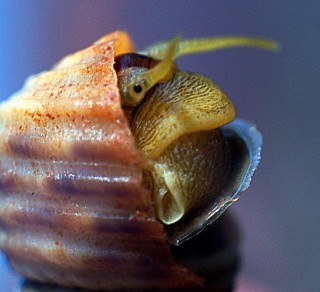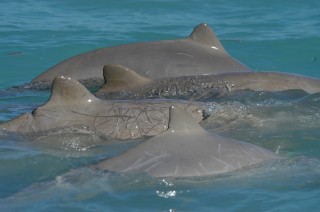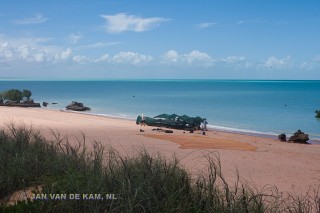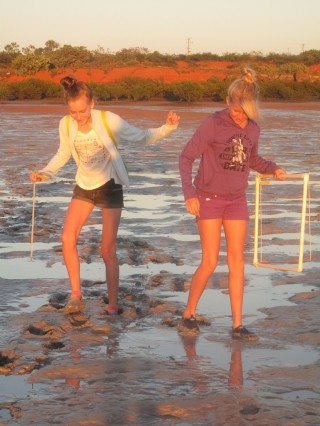Nov 26 2012
When do Roebuck Bay’s Invertebrates Reproduce?

This wonderful photo was taken by professional photographer/filmmaker Peter Strain. The mudflats in Roebuck Bay are a haven for birds because they teem with small invertebrates, like this snail. @ Peter Strain
Have you wondered when the 600 or more invertebrate species that live in the mudflats of Roebuck Bay reproduce? Monthly sampling over the last twelve years indicates great variability amongst species, so at any given time there is likely to be a lot of eggs and sperm being released into the water, which are hopefully fusing and then developing into larvae, then invertebrates, which are the food for thousands of migratory shorebirds, fish and more… Lots of good reasons to keep our drains clean of rubbish, fertilisers and garden waste during the wet season, as they can become food algal blooms of Lyngbya and impact the water quality which is not good for the wonderful marine life that exists in Roebuck Bay.
- Here are some easy tips to Keep Our Bay Clean this wet season »
- Here are some tips to Fertilise Wisely and Keep Our Bay Clean
Nov 21 2012
Interested in Roebuck Bay’s migratory shorebirds? Enjoy volunteering?
The Australasian Wader
Studies Group (AWSG) are looking for new members to get involved in their expeditions to Broome and 80 Mile Beach? If you are already a volunteer, but not a member, then consider the next step and seeing the fruits of your labour in notes, articles, reports and scientific papers.
Click on this AWSG Brochure to enable you to join. The price has just gone up but not on this brochure so if you join now you’ll be $5 better off! For more information, visit the Global Flyway Network »
Nov 21 2012
Tips to keep snubbies safe in the bay

Snubfin dolphins like the shallow waters in Roebuck Bay, so keep boat speed down to avoid injuries to these rare cetaceans. @ Dr Deb Thiele
Roebuck Bay is recognised as a hotspot for Australian snubfin dolphins. Only discovered in 2005, snubfins are Australia’s only endemic dolphin. They do however need our communities help to survive. Here are tips for boaters in Roebuck Bay:
- Maintain a stable course – no sudden direction change.
- Keep speed to less than five knots around creeks, mangroves, seagrass and shallow turbid waters.
- Be on the lookout for dolphins and slow down or idle engine until they are well clear of the boat.
- Minimise loss of monofilament line by not fishing against mangroves or other areas where line can be lost, and make sure you retrieve line and hooks.
Nov 5 2012
Seagrass is a sentinel
Seagrass is a sentinel of marine ecosystem health, because it responds quickly to changes in water quality. The Broome Seagrass Monitoring Project monitors Roebuck Bays’ seagrass four time s a year. The project is part of Seagrass Watch, a global scientific monitoring program that helps communities monitor some 259 seagrass meadows in 17 countries.
Volunteer work is invaluable to develop a dataset of information and evidence to determine whether variations observed in the seagrass are due to human impacts or natural variations.
Coastal seagrass can store more heat-trapping carbon per sq km than forests, so are part of the solution to climate change. So come and look after the seagrass meadows in Roebuck Bay and fight climate change!

